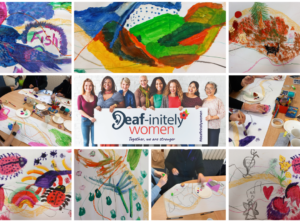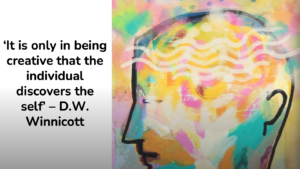DEAF-initely Women Art Therapy Workshop
Building a bridge between the deaf and hard of hearing community and Art Therapy has been something our Art Therapist, Hatty Pocock has been working hard on, leading to her running a workshop with DEAF-initely Women.
DEAF-initely Women, run and governed by deaf, deafblind, and hard of hearing women, serves all deaf and hard of hearing women in Derby, Derbyshire, Nottingham, Nottinghamshire, and beyond. The DEAF-initely Women team provide emotional strength to help women to cope with working and family life, as well as providing opportunities for the women they serve to gain confidence and experience new things.
Research shows that deaf and hard of hearing clients find access to appropriate supportive services difficult due to lack of therapists who can use sign language and are culturally affirmative.
Art Therapy uses a non-verbal way of communicating allowing individuals to freely express themselves and be liberated from the stigma that can be associated with medicalised views of deafness.
During the Art Therapy workshop with DEAF-initely Women, the attendees created some wonderful artwork, and these have been included in our ‘When Words Are Not Enough’ art exhibition. Take a peek at the workshop and some of their artwork below:

“Facilitating an art wellbeing group for the women at DEAF-initely was a privilege and it enabled me to see how Art Therapy can be such a powerful and transformative modality in supporting the Deaf and Hard of Hearing community. The group has proven to be remarkably effective, providing a unique and empowering space for self-expression, connection, and personal growth.”
-Hatty Pocock, NIDAS Art Therapist
What is Art Therapy?
Art Therapy is a form of psychotherapy that focuses on using art-making as its primary mode of communication. Created in the presence of an art therapist, art made in an Art Therapy session provides a focus for discussion, which helps the client to reflect and make sense of behaviours and emotions that might feel confusing and hard to put into words.
Individuals attending Art Therapy don’t have to have any previous art experience or any artistic ability. The focus within Art Therapy sessions is how the art-making process and art materials are used to express feelings, which is just as important as the final piece of artwork.
The overall aim is to enable the client to change and grow on a personal level through the use of art materials in a safe and facilitating environment.
NIDAS Art Therapy
Here at NIDAS, we offer 1-1, group and dyadic Art Therapy to women, young people, and children who have been affected by domestic abuse. Art Therapy can be client-led; focused weekly on what the client brings to the sessions, or sessions can be directed by the therapist; bringing a focus or theme to each week. This is all centred on the therapy aims and what was discussed in the assessment session.
Our Art Therapy can:
- Provide individuals with increased self-esteem, confidence, and identity.
- Support with depression and anxiety, trauma, attachment difficulties, loss/bereavement, social isolation, PTSD, neurodiverse diagnoses, personal development, self-harm, and suicidal thoughts.
What happens in an Art Therapy session?
All Art Therapy sessions are confidential and held in a private Art Therapy room, which lasts around 1-hour. Each session is a safe space for clients to use the art materials available to express themselves in ways in which they feel comfortable. Sessions encourage image making, playing, reflecting, and communication.
There are two different approaches that can be used:
- The psychodynamic approach – sessions are led by the client
- The directive approach – the Art Therapist will create an activity based on a specific theme
Art Therapy is also a time for survivors to have fun and learn new skills, which they will take forward on their journey to recovery.

If you would like more information about Art Therapy, please get in touch by calling us on 01623 683 250 or email [email protected].